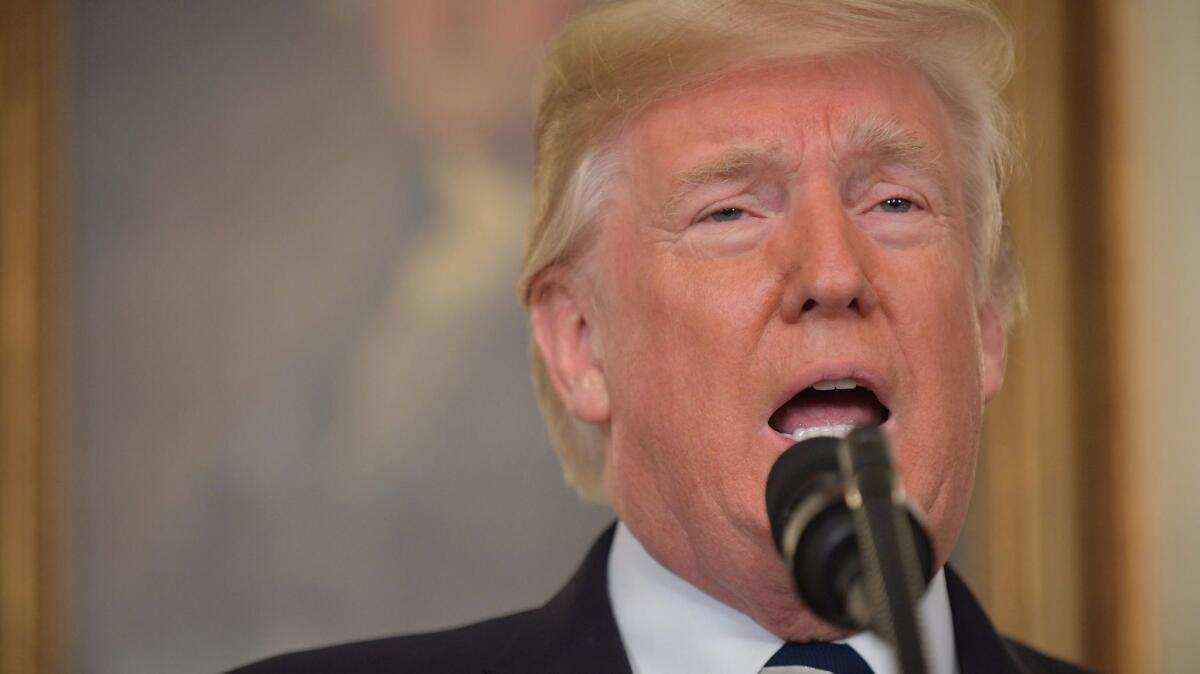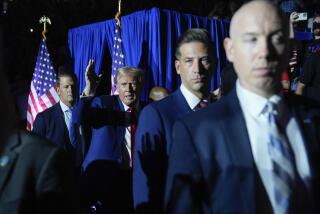Analysis: Trump offers the expected rhetoric of gun massacres, but little is expected to change

Reporting from Washington — In the immediate aftermath of a crushing national disaster, Americans want a consoler in chief, a president who tries to bind obvious wounds and unify a shattered public.
Then they want results, and usually get them: the strengthening of building regulations after a destructive hurricane; the engineering of safer airplanes after a calamitous crash.
America got its consoler in chief Monday morning when President Trump spoke somberly to the nation from the White House. They are not likely to get results beyond that.
Mass shootings like Sunday night’s tragedy in Las Vegas have become outliers: horrific events that lead to almost no change.
As Trump did on Monday, Republicans often respond to mass shootings with a benign lament, quoting Scripture, flaying evil and hoping aloud for the survivors. Democrats, too, cite Scripture but also angrily blame the easy availability of weapons. Neither side prevails.
The lack of results is a product of the nation’s angry and partisan disagreement over guns. It would be an anomaly if Sunday’s massacre of 59 people, with more than 500 wounded, has any impact when it comes to gun or related mental health laws.
The topic is particularly difficult for Republican politicians, given their party’s strong opposition to restrictions on guns and opposition to social spending. In their remarks Monday neither Trump nor Nevada Gov. Brian Sandoval talked at any length about how the shooter could slaughter so many so quickly at a country music concert.
Trump, in Washington, said he prayed “for the day when evil is banished and the innocent are safe from hatred and from fear.” Sandoval, in Las Vegas, referred twice to figuring out how to prevent such assaults.
“There’s not much we can do, but we can learn,” he said. About what, he did not say.
Martin Medhurst, a Baylor University scholar of political rhetoric, said those approaches were in keeping with how politicians typically approach the first hours of crisis. Their goal is to reassure the public that there is no continued threat, and that government officials are on top of any lingering problems.
He called Trump’s remarks Monday “the best speech he’s given yet as president.”
“I thought he hit all the right notes expressing this pure evil, expressing his condolences, giving voice to the grief and sorrow for the families’ experience, calling for national unity,” Medhurst said. “All of those are pretty standard themes, but that’s what people want.”
Even Democrats have been reluctant to use the first hours after a mass shooting to hammer their proposed solutions. Former President Obama was somewhat oblique when it came to his immediate response to mass shootings, although he forcefully backed gun restrictions at other times.
In emotional remarks the day 20 children and six elementary school employees were gunned down in Newtown, Conn., in 2012, Obama listed the shooting sites in recent years.
“As a country we’ve been through this too many times,” he said. “And we’re going to have to come together and take meaningful action to prevent more tragedies like this, regardless of the politics.”
But he did not offer specifics. Nearly three years later, after another mass shooting in San Bernardino, which was classified a terrorist event, he offered similarly mild sentiments.
“Right now it’s just too easy,” Obama said of finding guns. “And we’re going to have to, I think, search ourselves as a society to make sure that we can take basic steps that would make it harder — not impossible, but harder — for individuals to get access to weapons.”
Yet there is no “regardless of the politics,” as Obama put it. There were no substantial legislative changes after either shooting, despite Democratic efforts to expand mental health programs and somewhat limit the access to guns.
Trump has shifted his views on gun measures over the years. He once supported a ban on assault weapons, yet now presents himself as a fierce defender of the 2nd Amendment.
He talked of his opposition to gun restrictions twice in a speech 10 days ago in Alabama, where he touted gun ownership as a cherished value.
“If crooked Hillary [Clinton] got elected, you would not have a 2nd Amendment, believe me,” he said, and pantomimed a forced turning-over of weapons. “You’d be handing in your rifles, you’d be saying, ‘Here, here, here they are.’”
Trump’s evolution reflects that of his party, which has grown more dogmatic about protecting gun rights.
Asked whether it was more important to protect gun rights or to control ownership, 76% of Republicans cited protecting gun rights, according to a June Pew Research poll. Only 22% of Democrats agreed — a 54-point margin.
In 2000, the margin had been only 18 points. Over that span of time, Republican support for gun rights had doubled, whereas Democratic views remained nearly constant.
Republican views have been solidified by the power of the National Rifle Assn., which according to the Center for Responsive Politics spent $54.4 million in outside expenditures in the 2016 elections, and an additional $3.2 million on lobbying. The organization opposes all measures to restrict access to weapons and ammunition, even those supported by wide majorities of Americans.
As Trump avoided divisive language on Monday, others stepped in to deliver the predictable if heartfelt responses that spool out after every shooting.
“To all those political opportunists who are seizing on the tragedy in Las Vegas to call for more gun regs…You can’t regulate evil,” tweeted Matt Bevin, the Republican governor of Kentucky.
On the other side was Democratic Sen. Chris Murphy of Connecticut, who has become a nationally known supporter of gun restrictions since the Newtown massacre.
“This must stop,” he said. “It is positively infuriating that my colleagues in Congress are so afraid of the gun industry that they pretend there aren’t public policy responses to this epidemic. There are, and the thoughts and prayers of politicians are cruelly hollow if they are paired with continued legislative indifference.”
Barbara Perry, director of presidential studies at the University of Virginia’s Miller Center, noted that the circumstances of the Las Vegas shooting contradicted one of Trump’s and the NRA’s arguments for gun ownership: that the counterpoint to a bad guy with a gun is a good guy with one.
“If every single one of the [audience members] carried a weapon, they weren’t going to take out that man on the 32nd floor,” she said.
She recalled the June 14 shooting of Rep. Steve Scalise on a baseball field in Virginia, which prompted quick laments that went nowhere. The Louisiana Republican returned to the House only last week and is still undergoing therapy.
“There was a lot of talk…that no one should speak of policy on a day such as that,” Perry remembered. “When would it be more appropriate?”
Twitter: @cathleendecker
ALSO:
FBI says no evidence that Las Vegas massacre is act of international terrorism
Las Vegas shooting victims: Portraits of the fallen
Updates on California politics
More to Read
Get the L.A. Times Politics newsletter
Deeply reported insights into legislation, politics and policy from Sacramento, Washington and beyond. In your inbox three times per week.
You may occasionally receive promotional content from the Los Angeles Times.











